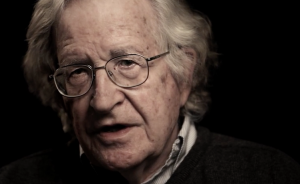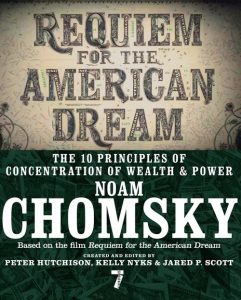Hopefully we’ll make it out the other side of Trump’s presidency, but it’s by no means a sure thing. The risks are hard to overstate.
While many books attempt to explain how we got to this political moment (some successfully), Noam Chomsky’s latest, Requiem for the American Dream, provides necessary historical context.
Zooming in on ten ways that government and corporate interests have kept the American people down, Chomsky offers a compelling history that explains today’s economic and political landscape.
At 157 pages, it’s a short, beautifully put together book. Based on a 2015 documentary of the same name, the book was created and edited by the team behind the film (which is widely available, including on Netflix).
Falling Apart
America is the richest country on earth, but it’s falling apart.
In a section about attacks on social programs like Medicare and public education, Chomsky describes the intentional hallowing out of vital American institutions.
“Infrastructure has collapsed, health care is a total wreck, the educational system is being torn to shreds, nothing works,” writes Chomsky.
Instead much of the country’s vast resources have been diverted to serving dominant corporate interests. “The welfare of the population is secondary, and often not cared for at all,” writes Chomsky.
And the population knows it. That’s why you have this tremendous antagonism toward institutions – all institutions. So, support of Congress is often in the single digits; the presidency is disliked; corporations are disliked; banks are hated – it extends all over.
The collapse of the country’s institutions has led to anger and disillusionment, a climate right for the rise of an ideologue.
The Rise of an Ideologue
“For many years, I have been writing and speaking about the danger of the rise of an honest and charismatic ideologue in the United States,” writes Chomsky, in a chapter titled “Marginalize the Population.” “Someone who could exploit the fear and anger that has long been boiling in much of the society, and who could direct it away from the actual agents of malaise to vulnerable targets.”
But Chomsky admits he hadn’t envisioned Trump, who’s sort of an ideologue without an ideology, aside from his extreme prioritizing of his own self-interest.
Yet there Trump is in the Oval Office (or perhaps at Mar-a-Lago). While the anger Trump rode in on continues going largely unaddressed.
The race to capitalize on this anger is between two flawed parties, one of which Chomsky calls “the most dangerous organization in world history.”
The Republicans “are just off the spectrum… [and] have moved so far toward a dedication to the wealthy and the corporate sector that they cannot hope to get votes on their actual programs.”
Meanwhile, the Democrats are “pretty much what used to be called moderate Republicans,” writes Chomsky.
“The spectrum has shifted so far to the right that what the population wants, and what was once mainstream, now looks radical and extremist.”
Like Bernie Sanders’ 2016 campaign.
“Across the board, [Sanders’] views and positions had substantial, if not majority, public support, and were pretty mainstream not long ago,” writes Chomsky. “The ‘political revolution’ that Bernie Sanders called for, rightly, would not have greatly surprised Dwight Eisenhower.”
What Can We Do?
Chomsky reminds readers that while the situation may be bleak, and human existence hangs in the balance, we have great freedoms, which were hard won.
Responding to the question “What can we do?” Chomsky writes, “Just about anything we choose to do.”


